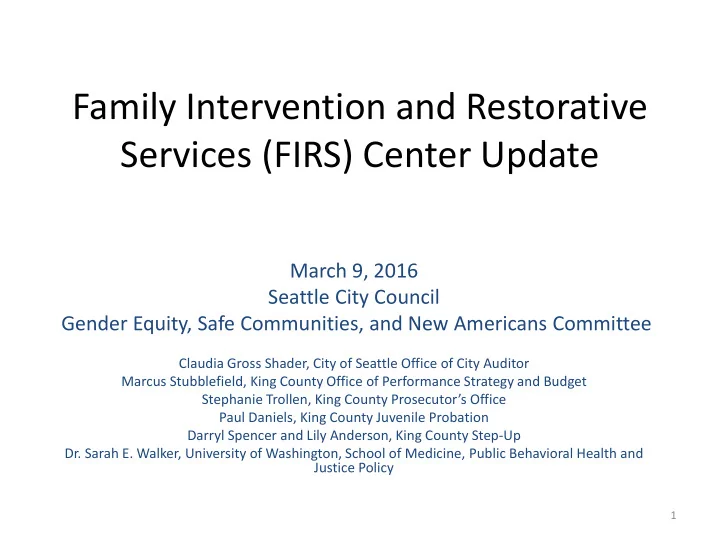

Family Intervention and Restorative Services (FIRS) Center Update March 9, 2016 Seattle City Council Gender Equity, Safe Communities, and New Americans Committee Claudia Gross Shader, City of Seattle Office of City Auditor Marcus Stubblefield, King County Office of Performance Strategy and Budget Stephanie Trollen, King County Prosecutor’s Office Paul Daniels, King County Juvenile Probation Darryl Spencer and Lily Anderson, King County Step-Up Dr. Sarah E. Walker, University of Washington, School of Medicine, Public Behavioral Health and Justice Policy 1
Juvenile Domestic Violence (DV) in Seattle Juvenile DV represents about 1/3 of new bookings to juvenile detention. In nearly 90% of these incidents, the youth has been violent toward a family member, often their mother. 31% of incidents (2011-2013) reported to the Seattle Police Department occurred in two Police sectors South Park/Delridge New Holly/Rainier Beach 2
Family Intervention and Restorative Services (FIRS) Pilot FIRS will provide immediate Projected Racial Analysis of access to services for youth Youth Who Will Be Served By and their families. Youth will FIRS Annually not have to be prosecuted to American get FIRS services. Indian Asian/ 5% Pacific Starting this summer, FIRS will Islander also provide a non-detention White 6% 40% respite/reception center for the youth. Black 37% FIRS Pilot is jointly funded by King County ($467,107) and Hispanic the City of Seattle ($254,000) 12% 3
Safe Families Continuum Prevention Intervention Supporting Healthy Family Addressing Specific Family Functioning Safety Needs FIRS 4
Community Input on FIRS Outreach to Youth, Families, and Community Organizations 100+ youth with history of juvenile justice, child welfare, • homelessness 24 parents previously involved in juvenile justice system • Parents and youth currently enrolled in Step-Up • Community organizations serving ethnic populations (Horn of Africa • Services, Consejo, Asian Counseling and Referral Services, etc.) African American faith-based community organizations • Findings from Community Outreach Youth and families want a facility that is “welcoming” and • “representative of us” Parents need support groups (e.g., gender groups, parenting, etc.) • Parents need support for root causes that adversely affect family • functioning (e.g., Employment, Housing, Mental Health, Substance Abuse, etc.) Need emphasis on prevention (e.g., evidence-based parenting classes) • 5
2016 FIRS Pilot – Timeline Jan-Feb Mar-Jun ( First 2 months) (Completion Phase 1) • Juvenile Probation Counselors fully • Detailed planning for the Access to operational integration of family safety Services • Additional Step-Up Social Workers planning and probation Without fully operational services with respite Criminal • Begin offering support services, safety center Charges plans, and EBTs at time of referral • Develop RFP; solicit responses from • Complete facility Non-Detention community-based organizations renovation Respite • Gather input from community about • Award contract to Center respite center design and services community-based offered organization • Design/begin construction work to • Develop training video for renovate facility police • Begin police training 6
2016 FIRS Pilot – Timeline (continued) Jul-Dec (Phase 2) • Gather feedback regarding new service model, including Access to Services input from families and community stakeholders Without Criminal Charges • Fully operationalize FIRS respite center for JDV cases Non-Detention • Conduct operational assessment; make necessary Respite Center adjustments • Gather feedback from institutional partners (incl. police) and community stakeholders 7
FIRS Respite/Reception Center (July 2016) Staffed 24/7 by community services provider • Welcoming atmosphere • Families will develop safety plan • Youth and families will be referred to services (Step-Up and/or • evidence-based interventions) Youth and family progress will be tracked • Youth and family will be asked to provide input on satisfaction and • cultural responsiveness Evaluators will track recidivism • 8
Step-Up is an internationally- Building Respectful recognized intervention Family Relationships developed and implemented by King County for families who have experienced family violence. Cognitive Respectful Restorative Behavioral Safety Skills Communication Process Skills Solution Strengths Collaborative Focused Based Family Based 9
FIRS Pilot Evaluation Plan FIRS Clients FIR Services Client/Family Outcomes • Time from Referral to • Less Violence and • Safety Risk and Needs Conflict in the Home • Geographic Service Start • Family Satisfaction with Distribution • Type of Services • Enrollment by (Safety Plan; Step-Up; Services and Cultural Responsiveness Ethnicity Multisystemic Therapy; Functional • Reason for Not Enrolling (if applicable) Family Therapy; etc.) • Service Completion Outcome Comparison 6 month recidivism Youth charged Youth • Violent arrests with family receiving FIRS • Other arrests violence in services other • Charges and counties dispositions 10
Looking Ahead for FIRS What is Planned FIRS Pilot Respite/Reception Center will open in July 2016 • U.S. Department of Justice Office of Justice Programs will complete • preliminary review of cultural adaptations for prevention and intervention services by July 2016 King County funding for FIRS for 2017 will be determined in fall 2016 • Findings from evaluation of FIRS Pilot by first quarter 2017 • What is Needed Seeking potential funding source for “softening” of FIRS Center • (couches, soft blankets, washer/dryer, area rugs, etc.) Provide evidence-based parenting programs, especially for • underserved populations Connect parents to needed support for root causes that adversely • affect family functioning (e.g., Employment, Housing, Mental Health, Substance Abuse, etc.) 11
Recommend
More recommend